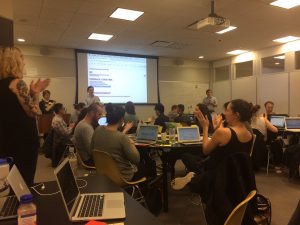
This is a guest post by Amanda Sanseverino, a first-year doctoral student in Accounting at the Graduate Center and attendee of the January 2017 Digital Research Institute. Follow her on Twitter or LinkedIn.

Most graduate students find there is very little time to do anything outside of what they need to do in order to stay afloat. Luxuries such as voluntary workshops, yoga classes, and appreciating the beauty of nature are privileges reserved for those who decide to embark on some other path in life. With this in mind, I’ll attempt to communicate why you really should apply for a week-long intensive course during your “time off.”
When I opened the e-mail calling for GC Digital Research Institute (GC DRI) applications, I was only a few months into the doctoral program and midterms were predictably interfering with my determination to have a Zen attitude about this whole thing. Earlier that week, I met with a professor about a potential research idea involving text analysis and he mentioned that Python might be a good way to implement it. I had two thoughts at the time: 1) I think Python is a programming language, and 2) If I learn this thing, chances are that I’ll immediately become a computer genius. Since Python was included in the GC DRI curriculum, I decided to apply. (That was happening in January, which was, importantly, not now, so why not?)
Now, just a few weeks after the GC DRI, I’m already using the skills I learned to move forward with the initial stages of my research idea. In a way that was enjoyable and accessible, the GC Digital Fellows taught Python, Git, the command line, machine learning, text analysis, and more. And while the entire week was filled with interesting and useful information, the technical skills were only a part of what I really got out of it.
Most of us know there’s a wealth of free online courses and guides, and, with ample motivation, one can ultimately find a way to acquire a particular digital skill. The most valuable thing I gained from the GC DRI was exposure. The goal is not to come out with a mastery of the digital research tools covered. Rather, it’s about understanding what’s out there and learning how to be flexible in your methods, because that knowledge will truly expand your research and teaching potential. It’s also about connecting with people in other areas of study. Talking to people outside of my discipline provided a window into what others are doing and helped me view my work in a different light. Exposure also came in the form of learning how to find help and resources in the future, whether through connecting with a Digital Fellow, attending a workshop, or getting involved in a project.
If you’re on the fence about taking part in the GC DRI, you should go for it. Any time spent there is an insanely small price to pay for the reward. (And, on top of that, you just might be able to tell your friends that you understand how a Twitter bot works.)
Amanda Sanseverino is a first-year doctoral student in Accounting and a CPA. Her current research interests include taxation, alternative investments, and standard setting. Before graduate school, she worked as a tax manager specializing in private equity funds.


